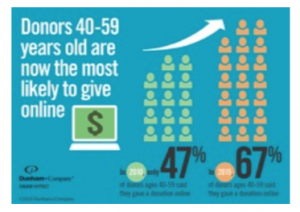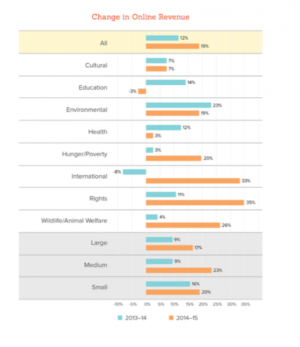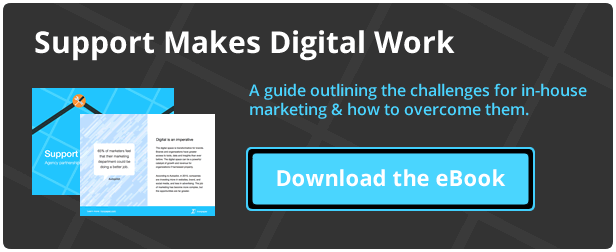

The nonprofit sector is experiencing several transformative shifts bringing new challenges and opportunities. The biggest among these are the changing demographics of givers, tumultuous economic and political dynamics, and technological innovations, according to The Philanthropy Outlook 2016 & 2017.

The study reported good news, though:
More than 60% of high-wealth donors support at least four organizations. — Abila
Profiling the Nonprofit Sector
Nonprofits keeping up with technology innovations have been able to enhance transparency, better engage donors and other constituents, and leverage peer-to-peer fundraising to provide greater ease in giving. Nonprofit websites and their digital presence is vital to sustainability.
At the same time, though, technology can “spread misinformation and exacerbate, or create, divides within communities,” according to the Outlook’s more than 2,000 respondents.
Nevertheless, NGOs worldwide are embracing the Internet. Among those surveyed for the 2016 NGO Online Technology Report:
The charitable sector is further influenced by greater ethnic diversity and new generations of leadership, swarms of individuals connecting with institutions, business becoming increasingly socially and environmentally engaged, and new models for social welfare and change.
Society-level factors creating challenges in the field included pervasive inequality, government dysfunction and distrust of institutions, social fragmentation and technology, communications and information overload.
Nearly 75 percent of those who volunteered say they are more likely to donate. — Abila
Nonprofit Trends and Tips
The changing face of the charitable sector is influencing nonprofit marketing.

Nonprofit marketers are having to target each giving generation differently. According to the Global NGO Online Technology Report, Millennials’ giving is most inspired by social media whereas email has the most impact on Gen X and Baby Boomers. Meanwhile, it’s predicted Gen Z will prefer mobile apps.
Donors of all ages are responding better to short, consumable, personalized content. Seek out opportunities to customize interactions while weaving the nonprofit’s impact story into every communication.
Personalization has become the norm. But this extends beyond a “Dear {Donor’s Name}” email greeting. Dive into the data to determine age, amount donated, what drove the donation, events attended and more to connect on an individual basis with givers.
On average 1.1% of website visitors made a donation. — M+R Benchmarks 2016
Monthly giving is on the rise. Although currently accounting for only 17% of all online revenue in M+R’s 2016 Benchmark study, this reflects rapid growth. In 2015, monthly revenue grew by 24% across all sectors, compared to 18% growth in one-time revenue. Encourage this by helping donors understand the value of monthly gifts and create content specific to these givers.
Email appeals are increasingly successful. Contrary to those claiming email is dead, M+R’s research found that among their 25 top performers, more than a third of all online revenue could track directly to an email appeal (34%). These top 25 also email revenue grow by 37% over 2014 levels (compared to 18% among all other groups surveyed).
M+R further noted: “Nonprofits sent more advocacy and fundraising emails in 2015 than they did in 2014. The average group sent 49 messages overall in 2015, including 19 fundraising appeals, 12 advocacy messages, and 9 newsletters.”
Online donation is ever easier. Facebook has added a Donate Now button, and there are several donation tools available for nonprofits. These make it more affordable for nonprofits to fundraise online, but also add convenience for donors.
62% of donors worldwide prefer to give online.— NonProfit Tech for Good
Throughout the marketing planning for nonprofits, it’s important to remember to make communications emotional and visual. Users often skip long passages of text in favor of illustrated examples and structured content. Be sure to convey the brand’s message in a convincing cause-based story-telling way.

Sources:
Abila’s Dietz, R. & Kelly, B. (2016). Donor Loyalty Study. https://www.abila.com/lpgs/donorloyaltystudy/abila_donor-loyalty-study.pdf
Independent Sector. (2015 October). Threads Insights from the Charitable Community. https://www.independentsector.org/uploads/ThreadsReport.pdf
M+R. (2016). Benchmarks 2016. https://mrbenchmarks.com/
Marts & Lundy. (n.d).The Philanthropy Outlook 2016 & 2017. https://philanthropyoutlook.com/index.php/introduction/
Nonprofit Tech for Good. (2016). 2016 Global NGO Online Technology Report. https://www.techreport.ngo/
by Jonathan Franchell, CEO of Ironpaper - For more tips and hacks: Need to remove a new line after h1 tags? Both web designers and SEO practitioners need to employ headline tags: H1, H2, H3 in several ways to improve web page structure and tag...

The marketing industry is transforming significantly due to generative AI and increasing market complexity. Gartner's prediction of a 25% decline in traditional search traffic suggests that the era of search engines is dying. AI tools, particularly...

The Crowded Arena of the IT Marketplace Updated December 2024 The Information Technology (IT) landscape is experiencing rapid growth and intensifying competition. IT spending is projected to reach nearly 5.1 trillion U.S. dollars in 2024, a...

Updated December, 2024 The field of digital marketing is evolving rapidly in response to new technology and changing buyer expectations. To help career-minded marketers, we’ve rounded up the top 10 skills needed to succeed in the field. These are...
